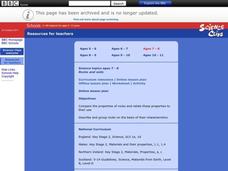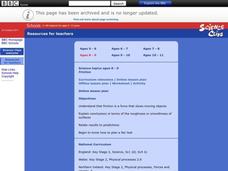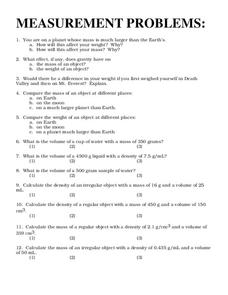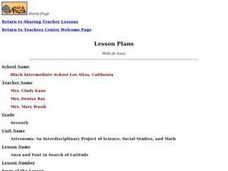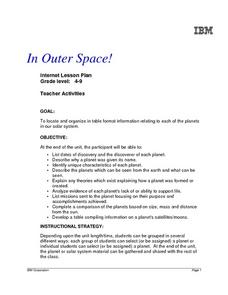Curated OER
Being Nosy About Our Neighbors
Middle schoolers use the scientific method to explore the effect of size on impact cratering. They compare images of landforms on Earth to those of other planets to compare surface processes. Students infer the geologic history of...
Curated OER
Measuring the Speed of Light
Learners explore physics by completing measurement problems in class. In this speed of light lesson, students discuss the importance of knowing the speed of light and how it affects many aspects of human life on Earth. Learners identify...
Curated OER
Changing Perspectives on the Sun's Diameter
For this sun's diameter worksheet, learners use a photograph taken by the SOHO satellite of the sun showing a change in diameter from one month to another. Students find the average diameter of the sun, they determine the percent change...
Curated OER
Scientist Tracking Network
Learners correlate surface radiation with mean surface temperature of several geographic regions. They observe how these parameters change with latitude and construct an understanding of the relationship of solar radiation to seasonal...
Curated OER
The Hudson's Ups and Downs
Fifth graders practice interpreting line graphs of the Hudson River water levels to assess the tides and tidal cycles in the estuary. They explore how weather can affect water levels and tides and observe that high tides and low tides...
Curated OER
Bellwork Week 20-Space Science
In this space worksheet, students answer questions about the size comparison of the moon, Earth, Solar System, Virgo Cluster, Milky Way Galaxy, and Universe, they answer questions about the Milky Way Galaxy and they sketch the life cycle...
Curated OER
Sky Watchers: Ancient Astronomers
Middle schoolers close their eyes and picture the sky. They are asked to brainstorm things they may see in the course of a night and day, such as the movement of the sun, moon, and stars. Students work in groups to coduct their...
Curated OER
The Mathematical Dynamics of Celestial Navigation and Astronavigation
Young scholars explore the different methods used in celestial Navigation and astronavigation. In this math lesson, students construct a sextant and demonstrate how it works.
Curated OER
Rocks and Soils
Learners compare the properties of rocks and relate these properties to their use. They perform a virtual experiment to describe and group rocks on the basis of their characteristics.
Curated OER
Friction
Young scholars compare and contrast the movement of objects on different surfaces, experimenting with friction and forces of motion. This friction lesson has numerous online tools including worksheets and virtual activities; the option...
Curated OER
When a Ruler is Too Short
Students measure distances using parallax. In this math lesson, students explain how this method helped astronomers with their studies of the solar system. They determine the length of their arm using parallax and compare it with other...
University of Colorado
Clay Planets
Why do scientists use models? In the first installment of 22, groups create scale models of our solar system. They then share and discuss their models.
Curated OER
Understanding Climate
Fourth graders create two dioramas out of household materials to compare the influence of various factors that impact climate. Each group discuss how the change in factors influenced the climate, flora, and fauna of their area.
Curated OER
Regolith Formation
Students compare and contrast the process of regolith formations. In groups, students define regolith and discover how regolith is formed on the Earth and on the Moon. They participate in experimental activities to simulate regolith.
Curated OER
Making a Crater
Students examine the characteristics of craters. In this crater lesson, students discover how meteors form craters on planets and moons as they make their own craters and respond to observational questions regarding the scientific...
Curated OER
Measurement Problems
In this measurement worksheet, students determine how gravity affects your weight and mass on a different planet. Students practice converting measurements to different units. This worksheet has 12 problems to solve.
Curated OER
Solar System Slide Show
Students work in small groups to research a planet in our Solar System in order to compare it to Earth. They examine the planet's size, atmosphere, rotation and revolution periods, temperature, and other attributes. They collect...
Curated OER
Sky Watching
Middle schoolers examine telescopes and understand how they have helped us better understand the sky. In this astronomy lesson students complete a worksheet and a lab activity.
Curated OER
Clay Planets
Students create scale models of the planets out of clay and compare them to the real planets.
Curated OER
What's Up?
Students compare and contrast the various heavenly bodies found in the sky at night. They identify the moon and stars in the sky as well as how the stars form pictures called constellations. Students also experiment with reflection and...
Curated OER
Celebrate The Four Seasons
Students investigate cause and effect and compare and contrast how recurring cycles are evident in multiple aspects of their education. They answer questions in the chosen field. Students model each aspect by interpreting, perceiving and...
Curated OER
Anza and Font in Search of Latitude
This is an integrated lesson that incorporates Social Studies, Science, and Mathematics. In Social Studies, 7th graders complete an online interview and complete an online worksheet about latitude of sites on the Anza trail. In Science...
Curated OER
In Outer Space
Students use the internet to gather information on the solar system. They identify the discoverer and unique characteristics of each planet. They compare and contrast each planet based on size, mass, and distance from the sun. They...
Curated OER
Properties of Rocks
Students compare the properties of rocks. They identify objects made of rocky materials such as walls, sidewalks, etc. Students describe and group rocks based on their characteristics.










